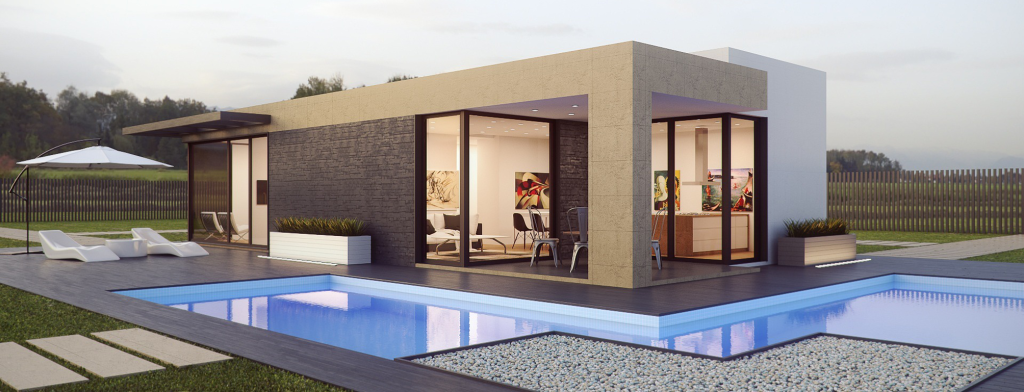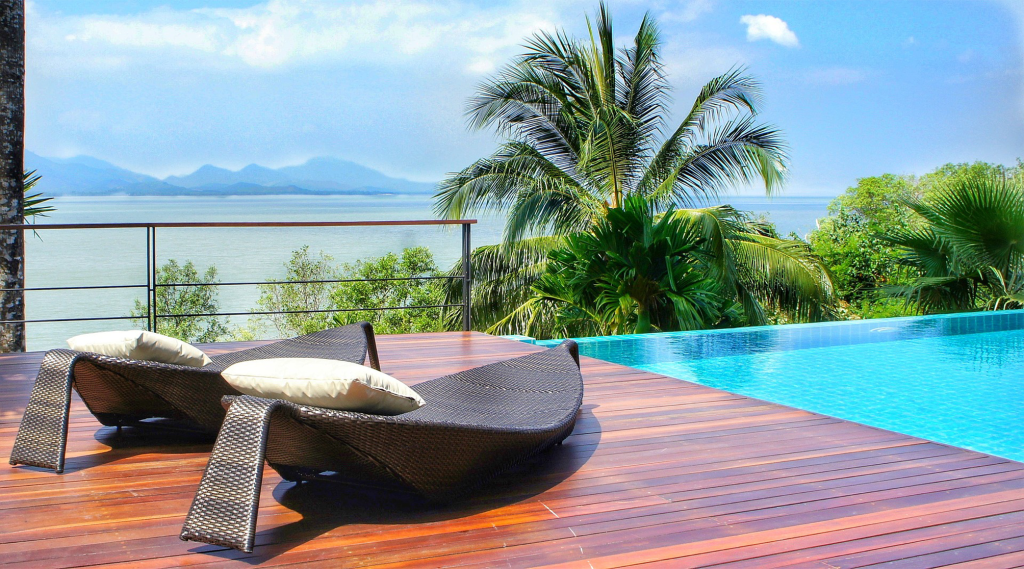Mr. Leonidas Odysseos, the owner of Relax Pools & Gardens Ltd., provides useful answers to all our queries.
Swimming pools, which several decades ago had been considered a luxury, can be said to have become nowadays a basic home amenity due also to changes in our country’s climate.
However, what do we need to know and watch out for about swimming pools before we decide to acquire one and integrate it in our homelife? Which traps might exist and how can we avoid them? Which types of pools are most suitable to our own needs and purposes? How much does each type cost and how can we properly maintain them?
By Nicola Karatzia
Translation by Irene Papakyriakou
What types of swimming pools are available in the market and what do we need to take into account before coming to a final decision?
The first decision we need to make before buying a swimming pool is type-related; that is, we need to choose if it’s going to be a “Skimmer” or an “Overflow” pool. Therefore, the total cost would depend both on the pool’s type and the way it’s constructed.
The Skimmer is the most common residential pool since it requires less space and it’s more affordable. Its distinguishing feature is that the water-level reaches up to 15-20 cm below deck level. Even though the Skimmer is not considered a luxurious type of pool, it could nonetheless become an especially attractive choice, depending on its construction materials.
The Overflow pool, on the other hand, is undoubtedly the most luxurious variety in the market. The characteristics which make an overflow pool so special are the serenity of the water – as the waves vanish into the channel – combined with the spectacle of the leveled water-surface while it harmoniously blends with the surrounding landscape. At this point, we should note that the overflow may pour over on one or more sides of the pool. For instance, in high-altitude houses with a view, it is more preferable that the overflow occurs on one side; this is known as the “Vanishing Edge” pool.
Based on your experience, which are the most common mistakes one may make while choosing a swimming pool and how can they avoid them?
Waterproofing is the most essential feature of a swimming pool and it is closely related to the quality of its construction. We tend to ignore the risk of leakage although it has been proven to occur quite frequently – even in the early years of a pool’s operation.
Lately, we notice all the more how people choose inappropriate construction materials – such as large garden patio ceramic tiles and concrete deck coating. But these materials don’t come with suitable specifications for pools as they pose serious risks and are not durable over time.
It is highly important then to make the right choice of a pool constructor. We should first check their reliability; good reputation; extensive experience; their preferred construction methods; the array of materials they use; their supporting team; their willingness to assume responsibility; and the after-sales services they provide. These are the main criteria that should inform our choice of a pool constructor. If our final decision is exclusively determined by price, then we may end up making more wrongful choices.
In this day and age, with particular focus on the Cypriot context, is the act of acquiring a pool at home considered an extravagance or are the market prices not as prohibitive?
The cost of a small pool starts at €10,000. This amount corresponds to countless days and nights of enjoyment and relaxation in our own personal space. As such, acquiring a pool is not considered a luxury; rather, it elevates the quality of our daily lives at home. Besides, it is well-known that swimming has multiple health benefits for the entire family, especially for parents, who usually have a limited free-time and, thus, may not be able to exercise adequately.

Which factors can significantly increase the final construction cost?
The final price is determined by the size, type, and materials used in the pool’s liner as well as by diverse additional features like the inclusion of a safety cover. While a safety cover significantly increases the price, it also provides benefits other than the obvious one, i.e., safety. These benefits include cost savings in maintenance services, free heating, and reduced chemical usage.
Typically, the value of the house one owns determines the price of the pool that will suit that house best. For a small plot of land, we may install a small and economical pool with a Skimmer surface that is made of cost-effective materials like a PVC Liner. For larger and more luxurious residences, a larger pool – usually with an overflow design, which is constructed with more expensive materials, such as ceramics – is certainly more suitable.
In the past, the most common choice for pool lining was mosaic tiles. Nowadays, I can see that there is a trend toward ceramics. Is this a matter of material quality and durability or just a fashion trend?
The main options for pool lining are porcelain ceramics, mosaic tiles, plaster-like coatings, and plastic membranes or PVC Liners.
Mosaic tiles dominated the market 20 years ago and, as a result, we can see many mosaic tiled pools in Cyprus. The attractively diverse color-combinations had been the principal factor for choosing such materials. Unfortunately, it has been proven that mosaic tiles are not durable over time as they tend to detach. Almost all pools lined with mosaic tiles needed to be renovated after 8-12 years.
On the other hand, porcelain ceramics are considered the most durable option over time. In fact, the range of available color-combinations for ceramics has significantly expanded and enriched in recent years, rendering ceramics the number-one choice.
However, for those seeking a more economical solution, the PVC Liner, which has also improved aesthetically with the introduction of new 3D types, is always a good option. As for plaster, it should be noted that it is no longer recommended in Cyprus due to the need to be reapplied after 10-15 years.
How exactly should a private pool be properly maintained? How often? How much does it cost approximately?
The maintenance of a pool is carried out in two ways: with the automatic operation of the equipment along with the use of proper chemicals; and with the cleaning of the pool’s surfaces with a brush and a vacuum. Recirculation with filtration is the principal way of cleaning the pool’s water; it aims to remove bacteria, algae, and debris, existing in the atmosphere and the environment, which all end up in our pool.
Cleaning with a brush and a vacuum should be done once or twice a week to remove floating debris such as leaves and dust. During the winter months, the frequency and hours of cleaning are reduced by half while the cost of chemicals for maintaining a small pool is approximately €300-€400 per year.
How often should the pool water be changed?
Pool water needs to be renewed regularly because it undergoes evaporation and backwashing. However, a complete water change is necessary at least every 4-5 years so as to prevent the possibility of saturation due to excessive chemical buildup.
Between chlorine water and saltwater, which one do you think outweighs the other in terms of benefits? Or is the choice between the two solely based on personal preference?
The pool is always filled with fresh water. In the case of a generator that produces chlorine through electrolysis, then a small amount of salt needs to be added – a much less amount than that found in seawater.
Cleaning is effected through chlorine production by electrolysis, which has the same properties and function as powdered chlorine.
What needs to be clarified then is that this particular kind of water is neither chlorine-free nor different from a pool with chlorine. The main difference between the two lies in the fact that chlorine does not need to be added. Nonetheless, cell reactors need to be replaced; this necessary action ultimately balances the overall cost between the two types of chlorination.
In case anyone is allergic to chlorine, it is advisable to opt for other high-quality systems which are completely chlorine-free, like the one manufactured by Dryden Aqua.
In the last 5-10 years, what would you say is the biggest or most significant change that has been noted regarding pools?
Pool technology is evolving and expanding as more and more people recognize its benefits. We have seen new construction methods that ensure waterproofing and resistance to natural wear and tear. Small-sized ceramic porcelain has prevailed over other pool finishes due to its quality and aesthetics.
With regard to the issue of disinfection, we have in our disposal modern and much more efficient methods – some of which are chlorine free. New pumps are compatible with photovoltaic installations and are more cost-effective. Pool heating is achieved faster and more economically with the use of Heat Pumps instead of the traditional boilers. Some of these advancements have already been successfully implemented in Cyprus.

Mainly in cases where we have small children or even pets at home, how can we eliminate possible pool-related risks and create a safer environment for them?
When it comes to safety, there is only one comprehensive solution, and that is a safety cover. Despite the availability of diverse alternative choices in the market, nothing adequately eliminates risks. Nevertheless, the safety cover is manufactured in compliance with ASTM specifications to protect us from hazards; it closes in a minute, easily and automatically or manually. Once it is closed, no one can open it without the key. That way, potential risks are eliminated.
When buying a house with an existing pool, possibly made with an older manufacturing method, what should we pay attention to and how can we tell whether the pool is in a good condition? Could there be any problems that are difficult to detect at first sight and that require a specialist’s inspection?
As I have pointed out earlier, waterproofing is the most important feature of a pool. An existing pool should definitely be inspected by a specialist who will prepare a comprehensive report of its condition and, where necessary, recommend restorative solutions.
It is quite common to come across existing pools which change hands and require partial or complete renovation, especially if the previous owners had neglected them. In such cases, we often need to change the pool’s materials, maintain or replace mechanical equipment, the lighting system, perimeter coping, and insulation. It would be wise to have such a thorough inspection conducted before finalizing the purchase of the property.

Is the choice of acquiring a pool suitable for everyone? Are there any factors which could act, in some cases, as deterrents to such a choice?
A swimming pool is a space of recreation and exercise, suitable for everyone. A pool can, of course, be customized to the personal needs and preferences of the people who will be using it. Each one can, for instance, choose: the type; facilitated access to the pool; depth range; water temperature; insulation; exercise mechanisms; and hydromassage. That’s exactly why, before designing a pool, we ought to inquire about the users’ wants and preferences so as to ensure the desirable, final result.

